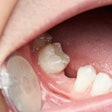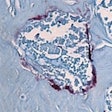Periodontal disease can induce metabolites associated with inflammation, oxidative stress, tissue degradation, and bacterial metabolism, according to a study in the Journal of Dental Research (November 2011, Vol. 90:11, pp. 1293-1297).
The goal of the study -- conducted by researchers from Colgate-Palmolive, Metabolon, and the State University of New York-Buffalo -- was to obtain a better understanding of oral diseases on a subclinical level.
The researchers investigated the impact of periodontitis on saliva. In the periodontal disease subjects, researchers measured increased levels of multiple classes of biochemicals, including dipeptide, amino acid, carbohydrate, lipids, and nucleotide metabolites. These changes indicated periodontitis is associated with increased degradation of proteins, triacylglycerol, glycerolphospholipids, polysaccharides, and polynucleotides.
"This macromolecular degradation provides a fertile environment for bacterial expansion as a result of the increased availability of metabolites to oral microflora for energy production," the researchers noted. "This more favorable energy environment for oral bacteria potentially exacerbates the disease state."


















